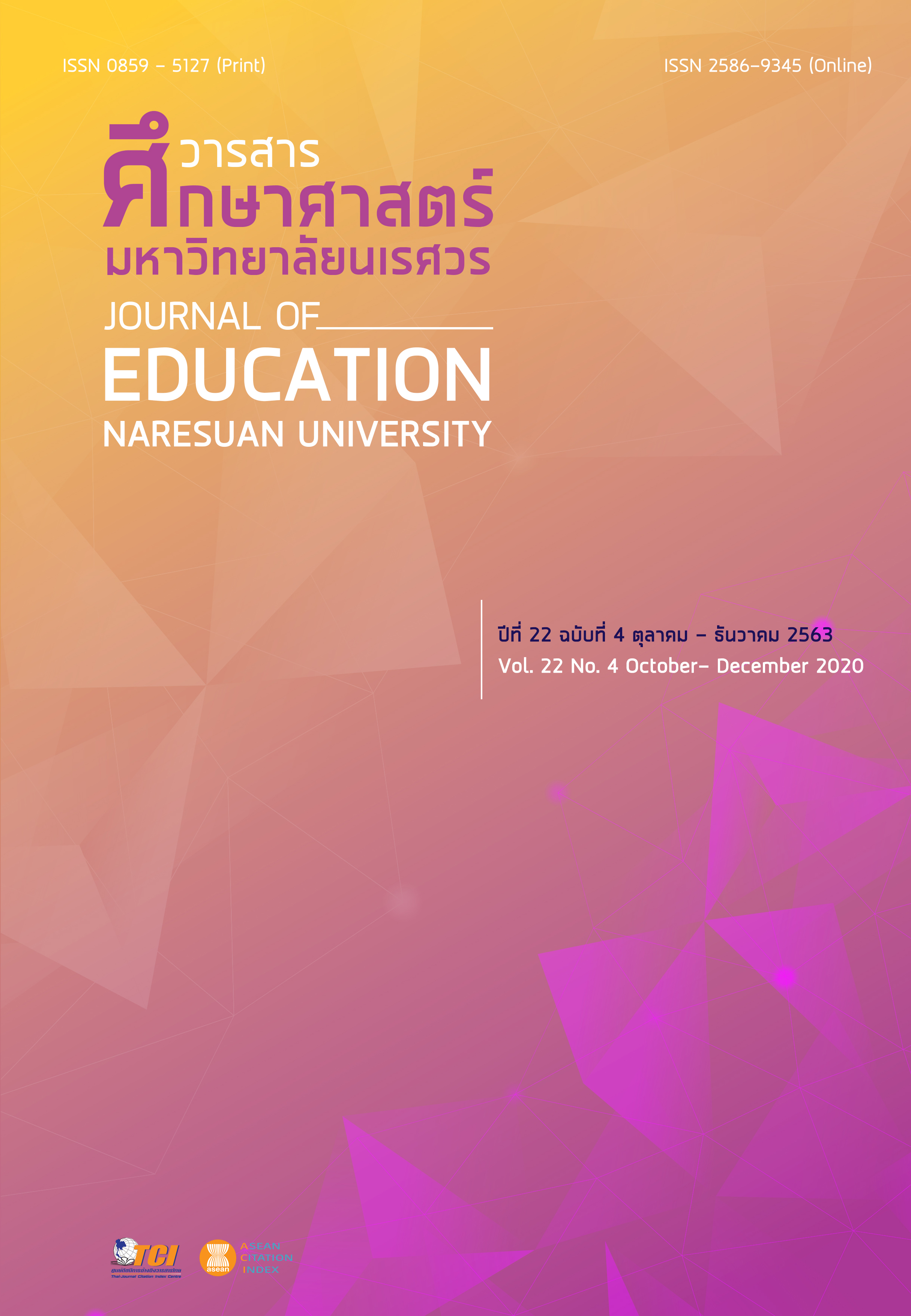การศึกษาผลสัมฤทธิ์ทางการเรียนและความสามารถในการคิดแก้ปัญหาของนักเรียน ชั้นมัธยมศึกษาปีที่ 6 ที่ได้รับการจัดการเรียนรู้ตามแนวคิดวิทยาศาสตร์ เทคโนโลยี สังคม และสิ่งแวดล้อม A STUDY OF LEARNING ACHIEVEMENT AND PROBLEM SOLVING ABILITY BY LEARNING MANAGEMENT THROUGH THE SCIENCE TECHNOLOGY SOCIETY AND ENVIRONMENT APPROACH OF GRADE 12TH STUDENTS
Main Article Content
บทคัดย่อ
การวิจัยครั้งนี้มีวัตถุประสงค์เพื่อเปรียบเทียบผลสัมฤทธิ์ทางการเรียน และความสามารถในการคิดแก้ปัญหาของนักเรียนชั้นมัธยมศึกษาปีที่ 6 ที่ได้รับการจัดการเรียนรู้ตามแนวคิดวิทยาศาสตร์ เทคโนโลยี สังคม และสิ่งแวดล้อม กับนักเรียนที่ได้รับการจัดการเรียนรู้แบบปกติ และเปรียบเทียบผลสัมฤทธิ์ทางการเรียน และความสามารถในการคิดแก้ปัญหาของนักเรียนหลังเรียนด้วยการจัดการเรียนรู้ตามแนวคิดวิทยาศาสตร์ เทคโนโลยี สังคม และสิ่งแวดล้อม กับเกณฑ์ร้อยละ 70 กลุ่มตัวอย่าง ได้แก่ นักเรียนชั้นมัธยมศึกษาปีที่ 6 โรงเรียนมัธยมศึกษาแห่งหนึ่งในจังหวัดนราธิวาส จำนวน 82 คน จำนวน 2 ห้องเรียน การวิจัยครั้งนี้เป็นการวิจัยเชิงทดลอง เก็บรวบรวมข้อมูล โดยใช้แบบวัดผลสัมฤทธิ์ทางการเรียน แบบวัดความสามารถในการคิดแก้ปัญหา วิเคราะห์ข้อมูล โดยใช้ค่าเฉลี่ย ส่วนเบี่ยงเบนมาตรฐาน สถิติการวิเคราะห์ความแปรปรวนร่วม และสถิติการทดสอบที ผลการวิจัย พบว่า ผลสัมฤทธิ์ทางการเรียนและความสามารถในการคิดแก้ปัญหาของนักเรียน ที่ได้รับการจัดการเรียนรู้ตามแนวคิดวิทยาศาสตร์ เทคโนโลยี สังคม และสิ่งแวดล้อม สูงกว่านักเรียนที่ได้รับการจัดการเรียนรู้แบบปกติอย่างมีนัยสำคัญทางสถิติที่ระดับ .01 และพบว่า ผลสัมฤทธิ์ทางการเรียนและความสามารถในการคิดแก้ปัญหาของนักเรียนหลังได้รับการจัดการเรียนรู้ตามแนวคิดวิทยาศาสตร์ เทคโนโลยี สังคม และสิ่งแวดล้อม หลังเรียนสูงกว่าเกณฑ์อย่างมีนัยสำคัญทางสถิติที่ระดับ .01
Article Details
เจ้าของบทความมิได้คัดลอก หรือละเมิดลิขสิทธิ์ของผู้ใด หากเกิดการละเมิดลิขสิทธิ์ ไม่ว่าวิธีใด หรือการฟ้องร้องไม่ว่ากรณีใด ๆ ที่อาจเกิดขึ้นได้ กองบรรณาธิการวารสารศึกษาศาสตร์ ไม่มีส่วนเกี่ยวข้องทั้งสิ้น ให้เป็นสิทธิ์ของเจ้าของบทความที่จะดำเนินการ
เอกสารอ้างอิง
Ahlee-ae, S. (2015). Effects of science, technology, society and environment approach on chemistry achievement, problem solving ability and instructional satisfaction of grade 12 students (Master thesis). Songkla: Prince of Songkla University. [in Thai]
Aikenhead, G. S. (1988). Teaching science through a science-technology-society-environment approach: An instruction guide. Canada: Faculty of Education, University of Regina.
Detyothin, O., Singsriwo, A., & Suksringarm, P. (2017). The development of environmental literacy of mattayomsuksa 3 students using the project-based teaching with problem-solving thinking. Journal of Education Naresuan University, 19(2), 305 – 317. [in Thai]
Heepkeaw, P. (2009). The development of problem solving and science learning achievement unit resources and environmental of mathayomsuksa three students by the problem-base learning (Master thesis). Khon Kaen: Khon Kaen University. [in Thai]
Institute for the Promotion of Teaching Science and Technology. (2011). Teacher’s manual of Biology V for grade 10-12 students, substance of science, based on the basic education core curriculum B.E. 2551 (A.D. 2008). Bangkok: Office of the Welfare Promotion Commission for Teachers and Education Personnel Printing Ladphrao. [in Thai]
Janta, P., Pattarathitinant. S., & Saksoong, P. (2012). The effects of science, technology, society and environment approach on problem solving ability of grade 10 students. The 2nd STOU Graduate Research Conference, 2012 (1), 1-15. [in Thai]
Kongson, R., & Penkaew, P. (2013). The development learning activities for teaching chemistry subject on science-technology-society and environment approach to promote students’ problem solving thinking skill. Veridian E-Journal of Silpakorn University, 6(2), 50-64. [in Thai]
Kumar, D., & Chubin, D. (2000). Science technology and society: A sourcebook or research and practice. London: Kluwer Academic.
Ministry of Education. (2008). The basic education core curriculum B.E. 2551 (A.D. 2008). Bangkok: The Agricultural Cooperative Federation of Thailand. [in Thai]
National Institute of Educational Testing Service (Public Organization). (2015). Basic statistics of the results of the national basic education test (O-NET), Mathayomsuksa 6, academic year 2558. Retrieved May 10, 2016, from http://www.newonetresult.niets.or.th [in Thai]
Nuangchalerm, P. (2015). 21st century learning in science. Journal of Rangsit University: Teaching & Learning, 9(1), 136-154. [in Thai]
Nukrak, S., Sirikolkajorn, A., & Kijkuakui, S. (2016). The development of understanding and scientific literacy for mathayomsuksa 6 students by learning management through science, technology, society, and environmental approach hydrocarbon compound. Veridian E-Journal, Silpakorn University, 9(2), 1322 - 1333. [in Thai]
Office of National Education Standards and Quality Assessment. (2012). The external quality assessment results. Retrieved May 10, 2016, from http://aqa.onesqa.or.th [in Thai]
Office of the National Education Commission. (2003). National Education Act B.E. 2542 (1999) and Amendments (Second National Education Act B.E. 2545 (2002). Bangkok: Pimdeekarnpim. [in Thai]
Pedretti, E. (2005). STSE education: Principles and practices. in Aslop S., Bencze L., Pedretti E. (eds.) Analysing exemplary science teaching: Theoretical lenses and a spectrum of possibilities for practice Maidenhead. Open University, Mc Graw-Hill Education.
Pitiporntapin, S., Yutakom, N., Pradermwong, K., & Anderson, D. (2011). Case studies: Enhancing elementary science teachers’ views and practices of zoo-based science, technology, society, and environment (STSE) approach through a professional development program. International Journal of Education, 33(3), 138-154.
Potjanatanti, N. (2005). STS science technology and society model. Songkla: Department of Education, Prince of Songkla University. [in Thai]
Richardson, G., & Blades, D. (2000). Social studies and science education: Developing world citizenship through interdisciplinary partnerships. Canada’s National Social Studies Journal, 35(3), 10.
Roth, W. M., & Kim, M. (2008). Rethinking the ethics of scientific knowledge: A case study of teaching the environment in science classrooms. Asia Pacific Education Review, 4(2008), 516-528.
Rugbida, A. (2006). Effects of the science, technology and society approach on achievement and problem solving ability and satisfaction of mathayomsuksa five students (Master thesis). Songkla: Prince of Songkla University. [in Thai]
Sangthong, W., Faikhamta, S., & Yutakom, Y. (2010). Seventh grade views on science-technology-society related to chemical issues. KKU Research Journal, 15(2), 142 – 154. [in Thai]
Suiloi, W. (2009). The biology teachers' development of learning management in biology based on science, technology, and society approach (Master thesis) Songkla: Prince of Songkla University. [in Thai]
Suriyawong, S., Reangsri, S., & Sekthawong, P. (2011). Educational research methodology. Bangkok: Academic Support Center. [in Thai]
Tanpromma, M., & Chanunan, S. (2015). Effects of the learning activities based on science technology society and environment (STSE) approach in learning about nanomaterial in daily life on mathayomsuksa two students’ analytical thinking and decision making. Journal of Education, 26(3), 267-278. [in Thai]
Tuansulong, T. (2009). Effects of science, technology and society approach on achievement and problem solving ability of mattayomsuksa five students (Master thesis). Songkla: Prince of Songkla University. [in Thai]
Yörük, N., Morgil, I., & Seçken, N. (2009). The effects of science, technology, society and environment (STSE) education on students’ career planning. US-China Education Review, 6(8), 68-74.


